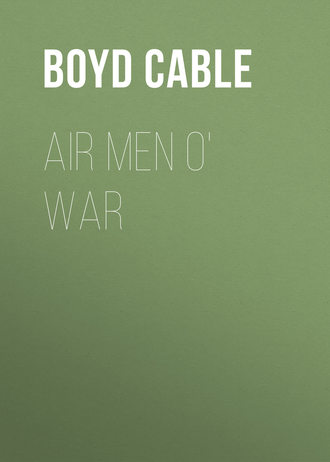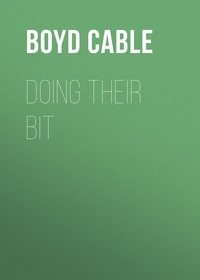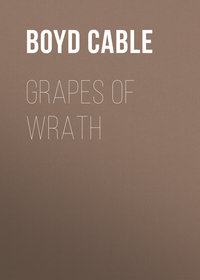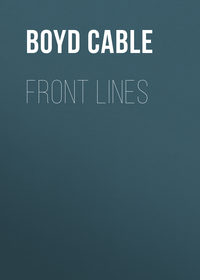 полная версия
полная версияAir Men o' War
At that precise moment – and this was the first warning he had that there were Huns about – he heard a ferocious rattle of machine-gun fire, and got a glimpse of streaking flame and smoke from the tracer bullets whipping past him. The Huns, three of them and all fast fighting scouts, had seen him coming, had probably watched him drop back out of place in the Flight, had kept carefully between him and the sun so that his glances round and back had failed to spot them in the glare, and had then dived headlong on him, firing as they came. They were coming down on him from astern and on his right side, or, as the Navals would put it, on his starboard quarter, and they were perhaps a hundred to a hundred and fifty yards off when Ricky first looked round and saw them.
His first and most natural impulse was to get clear of the bullets that were spitting round and over him, and in two swift motions he had opened his engine full out and thrust his nose a little down and was off full pelt. Promptly the three astern swung a little, opened out as they wheeled, dropped their noses, and came after Ricky, still a little above him, and so fairly astern that only the centre one could keep a sustained accurate fire on him. (A scout's gun being fixed and shooting between the blades of the propeller – gun and engine being synchronised so as to allow the bullet to pass out as the blade is clear of the muzzle – means that the machine itself must be aimed at the target for the bullets to hit, and the two outer machines of the three could only so aim their machines by pointing their noses to converge on the centre one – a risky manœuvre with machines travelling at somewhere about a hundred miles an hour.)
But the fire of that centre one was too horribly close for endurance, and Ricky knew that although his being end-on made him the smaller target, it also made his machine the more vulnerable to a raking shot which, piercing him fore and aft, could not well fail to hit petrol tank, or engine, or some other vital spot. He could do nothing in the way of shooting back, because, being a single-seater scout himself, his two guns were trained one to shoot straight forward through the propeller, the other, mounted on the top plane on a curved mount which allowed the gun to be grasped by the handle above his head and pulled back and down, to shoot from direct ahead to straight up. Neither could shoot backward.
Ricky, the first shock of his surprise over, had gauged the situation, and this, it must be admitted, was dangerous, if not desperate. He had dropped back and back from the Flight, until now they were something like a mile ahead of him. A mile, it is true, does not take a modern machine long to cover, but then, on the other hand, neither does an air battle take long to fight, especially with odds of three to one. With those bullets sheeting past him and already beginning to rip and crack through his wings, any second might see the end of Ricky. It was no use thinking longer of running away, and even a straight-down nose-dive offered no chance of escape, both because the Huns could nose-dive after him and continue to keep him under fire, and because he was well over Hunland, and the nearer he went to the ground the better target he would make for the anti-aircraft gunners below. He must act, and act quickly.
A thousand feet down and a quarter of a mile away was a little patch of cloud. Ricky swerved, dipped, and drove "all out" for it. He was into it – 400 yards remember – in about the time it takes you to draw three level quiet breaths, and had flashed through it – five or six hundred feet across it might have been – in a couple of quick heart-beats. The Huns followed close, and in that half-dozen seconds Ricky had something between fifty and a hundred bullets whizzing and ripping past and through his wings. As he leaped clear of the streaming wisps of the cloud's edge he threw one look behind him and pulled the joy-stick hard in to his stomach. Instantly his machine reared and swooped up in the loop he had decided on, up and over and round. At the first upward zoom Ricky had pulled down the handle of his top gun and brought it into instant action. The result was that as he shot up and over in a perfect loop the centre machine, which had been astern of him, flashed under and straight through the stream of his bullets.
Ricky whirled down in the curve of his loop with his gun still shooting, but, now he had finished his loop and flattened out, shooting up into the empty air while his enemy hurtled straight on and slightly downward ahead of him. Instantly Ricky threw his top gun out of action, and, having now reversed positions, and having his enemy ahead, steadied his machine to bring his bow gun sights to bear on her. But before he could fire he saw the hostile's right upper plane twist upward, saw the machine spin side on, the top plane rip and flare fiercely back and upward, the lower plane buckle and break, and the machine, turning over and over, plunge down and out of his sight. One of his bullets evidently had cut some bracing wires or stays, and the wing had given to the strain upon it.
So much Ricky just had time to think, but immediately found himself in a fresh danger. The two remaining hostiles had flashed past him at the same time as the centre one, while he threw his loop over it, but, realising apparently on the instant what his manœuvre was, they both swung out and round while he passed in his loop over the centre machine. It was smart work on the part of the two flanking hostiles. They must have instantly divined Ricky's dodge to get astern of them all, and their immediate circle out and round counteracted it, and as he came out of his loop brought them circling in again on him. For an instant Ricky was so concentrated on the centre machine that he forgot the two others; but, the centre one down and out, he was suddenly roused to the fresh danger by two following short bursts of fire which flashed and flamed athwart him, and caught a glimpse of the other two closing in again astern of him and "sitting on his tail."
Both were firing as they came, and again Ricky felt the sharp rip and crack of explosive bullets striking somewhere on his machine, and an instant later knew the two were following him and hailing lead upon him. He cursed savagely. He had downed one enemy, but here apparently he was little if any better off with two intact enemies in the worst possible position for him, "on his tail," and both shooting their hardest.
A quick glance ahead showed him the white glint of light on the wheeling wings of his Flight, attracted by the sight of his battle, circling and racing to join the fight. But, fast and all as they came, the fight was likely to be over before they could arrive, and with the crack and snap of bullets about him and his own two guns powerless to bear on the enemy, it looked uncomfortably like odds on the fight ending against him. Another loop they would expect and follow over – and the bullets were crippling him every instant.
Savagely he threw his controls over, and his machine slashed out and down to the right in a slicing two-hundred-foot side-slip. The right-hand machine whirled past him so close that he saw every detail of the pilot's dress – the fur-fringed helmet, dark goggles, black sweater. He caught his machine out of her downward slide, drove her ahead, steadied her, and brought his sights to bear on the enemy a scant twenty yards ahead, and poured a long burst of fire into her. He saw the streaking flashes of his bullets pouring about and over her top planes, dipped his muzzle a shade, and saw the bullets break and play on and about the pilot and fuselage. Then came a leaping flame and a spurt of black smoke whirling out from her; Ricky had a momentary glimpse of the pilot's agonised expression as he lifted and glanced wildly round, and next instant had only in his sight a trailing black plume of smoke and the gleam of a white underbody as the enemy nose-dived down in a last desperate attempt to make a landing before his machine dissolved in flames about him.
With a sudden burst of exultation Ricky realised his changed position. A minute before he was in the last and utmost desperate straits, three fast and well-armed adversaries against his single hand. Now, with two down, it was man to man – no, if he wished, it was all over, because the third hostile had swung left, had her nose down, and was "hare-ing" for home and down towards the covering fire of the German anti-aircraft batteries. Already she was two to three hundred yards away, and the first German Archie soared up and burst with a rending "Ar-r-rgh" well astern of him.
But Ricky's blood was up and singing songs of triumph in his ears. Two out of three downed; better make a clean job of it and bag the lot. His nose dipped and his tail flicked up, and he went roaring down, full out, after his last Hun. A rapid crackle of one machine-gun after another struck his ear before ever he had the last hostile fully centred in his sights. Ricky knew that at last the Flight had arrived and were joining in the fight. But he paid no heed to them; his enemy was in the ring of his sight now, so with his machine hurling down at the limit of speed of a falling body plus all the pull of a hundred and odd horse-power, the whole fabric quivering and vibrating under him, the wind roaring past and in his ears, Ricky snuggled closer in his seat, waited till his target was fully and exactly centred in his sights, and poured in a long, clattering burst of fire. The hostile's slanting nose-dive swerved into a spin, an uncontrolled side-to-side plunge, back again into a spinning dive that ended in a straight-downward rush and a crash end-on into the ground.
Whether it was Ricky or some other machine of the Flight that got this last hostile will never be known. Ricky himself officially reported having crashed two, but declined to claim the third as his. On the other hand, the rest of the Flight, after and always, with enthusiastic unanimity, insisted that she was Ricky's very own, that he had outplayed, outfought, and killed three Huns in single combat with them – one down and t'other come on. If Ricky himself could not fairly and honestly claim all rights to the last Hun, the Flight did for him.
"Three!" they said vociferously in mess that night, and would brook no modest doubts from him. And to silence all doubts the Squadron poet composed a song which was sung by the mess with a fervour and a generous slurring over of faulty metre (a word the poet didn't even know the meaning of) that might have stirred the blood of a conscientious objector. It was entitled, "Three Huns Sat on his Tail," and was sung to the tune of "There were Three Crows Sat on a Tree," or, as the uninitiated may prefer, "When Johnny Comes Marching Home," and it detailed the destruction of the Huns one by one, verse by verse.
When I tell you it was sung chanty fashion, with the first, second, and last lines chorused by the mess, I can leave you to imagine the loud-pedal, full, fortissimo effect of the "Hurrahs," and (helped out with feet, with fists, spoons, and anything else handy to resound upon the table) of the final rolling "Cr-r-r-ash."
There were three Huns sat on his tail,Hurrah, hurrah!But he looped over one and gave him "HailColum-bi-a!"He shot up the Hun so full of leadThat before he knew he was hit he was dead,And our Archie look-out reporting said:One! – CR-R-R-ASH!But all this was later, and is going a little ahead of the story. As the last Hun went reeling down, Ricky, in the official language of the combat reports, "rejoined formation and continued the patrol." He pulled the stick towards him and rose buoyantly, knowing that he was holed over and over again, that bullets, and explosive bullets at that, had ripped and rent and torn the fabrics of his machine, possibly had cut away some strut or stay or part of the frame. But his engine appeared to be all right again, had never misbehaved a moment during the fight, was running now full power and blast; his planes swept smooth and steady along the wind levels, his controls answered exactly to his tender questioning touch. He had won out. He was safe, barring accident, to land back in his own 'drome; and there were two if not three Huns down on his brazen own within the last – how long?
At the moment of his upward zoom on the conclusion of the fight he glanced at his clock, could hardly believe what it told him, was only convinced when he recalled that promise to himself to turn back at the end of that minute, and had his belief confirmed by the Flight's count of the time between their first turning back and their covering the distance to join him. His clock marked exactly noon. The whole fight, from the firing of the first shot to the falling away of the last Hun, had taken bare seconds over the one minute.
That pilot was right; in air fighting "you don't get time to think."
Quick is the word and quick is the deedIf you would live in the air-fight game;Speed, give 'em speed, and a-top of it – speed!(Man or machine exactly the same).Think and stunt, move, shoot, quickly; or die,Fight quick or die quick; when all is said,There are two kinds of fighters who fly,Only two kinds – the quick, and the dead.VII
THE AIR MASTERS
It is hardly known to the general public – which seems a pity – that the Navy has, working on the Western Front, some Air Squadrons who fly only over the land and have not so much as seen the sea, except by chance or from a long distance, from year's end to year's end. They have carried into their shore-going lives a number of Navy ways, like the curt "Thank God" grace at the end of a meal, or the mustering of all hands for "Divisions" (Navalese for "Parade") in the morning, marking off the time by so many "bells," hoisting and lowering at sunrise and sunset the white ensign flown on a flagstaff on the 'drome; they stick to their Navy ratings of petty officers and sub-lieutenants and so on, and interlard their speech more or less with Navy lingo – a very useful and expressive one, by the way, in describing air manœuvres – but otherwise carry out their patrols and air work with, and on about the same lines as, the R.F.C.
Naval Number Something is a "fighting scout" Squadron, which means that its sole occupation in life is to hunt for trouble, to find and fight, "sink, burn or destroy" Huns. At first thought it may seem to the Army which fights "on the floor" that this job of a fighting machine is one which need interest no one outside the Air Service, that it is airman fighting against airman, and that, except from a point of mere sporting interest, the results of these fights don't concern or affect the rest of the Army, that the war would roll on just the same for them whichever side had the upper hand in the air fighting. Those who think so are very far wrong, because it is on the fighters pure and simple that the air mastery depends. Air work is a business, a highly complicated, completely organised and efficient business, and one bit of it has to dovetail into another just as the Army's does. The machines which spot for our guns, and direct the shooting of our batteries to destroy enemy batteries which would otherwise destroy our trenches and our men in them; the reconnaissance machines which fly up and down Hunland all day and bring back reports of the movements of troops and trains and the concentration or removal of forces, and generally do work of which full and true value is known only to those Heads running the war; the photographing machines which bring back thousands of pictures of all sorts – the line knows a few, a very few, of these, and their officers study very attentively the trench photos before they go over the top in a raid or an attack, and so learn exactly how, why, and where they are to go; the bombing machines which blow up dumps of ammunition destined for the destruction of trenches and men, derail trains bringing up reinforcements or ammunition to the Hun firing line, knock about the 'dromes and the machines which otherwise would be gun-spotting, reconnoitring, and bombing over our lines – and perhaps some day one may tell just how many Gotha raids have been upset, and cancelled by our bomb-raids on a Hun 'drome – all these various working machines depend entirely for their existence and freedom to do their work on the success of the fighting machines. The working machines carry guns, and fight when they have to, but the single-seater fighting machines are out for fight all the time, out to destroy enemy fighters, or to put out of action any enemy working machine they can come across.
The struggle for the air mastery never ceases, and although it may never be absolute and complete, because the air is a big place to sweep quite clear and clean, the fact that scores of our machines spend all their flying hours anywhere over Hunland from the front lines to fifty miles and more behind them for every one Hun who flies over ours and, after a cruise of some minutes, races back again, is fairly good evidence of who holds the whip hand in the air.
All this introduction is necessary to explain properly the importance of the fighting squadrons' job, and why the winning of their fights is of such concern to every man in the Army, and to every man, woman, and child interested in any man in the Army. It also serves to explain why it was that three machines of Naval Number Something "leapt into the air" in a most tremendous hurry-skurry, the pilots finishing the buckling of their coats (one going without a coat indeed) and putting on goggles after they had risen, when the look-out at the Squadron telescope reported that there were four Hun two-seater machines circling round at about 10,000 or 12,000 feet and just far enough over our front lines to look suspiciously like being on a gun-spotting or "Art. – Ob." bit of business.
That such a performance should be taking place almost within sight of their own 'drome doorstep naturally annoyed the Navals, and led to the immediate and hurried steps which took the three machines and pilots who were first ready into the air in "two shakes of the jib-sheet." The three men were all veteran fighters, and their machines three of the Squadron's best, and if the four Huns had known their reputations and calibre it is doubtful if they would have dared to hang about and carry on with their work as they did. There was "Mel" Byrne, a big man with a D.S.C. and a Croix de Guerre ribbon on his breast, and a score of crashed Huns notched to his credit, flying his "Kangaroo"; "Rip" Winkle, who had once met and attacked, single-handed, seven Huns, shot down and crashed three hand-running and chased the others headlong as far over Hunland as his petrol would take him: he was in his "Minnenwerfer"; and the "next astern" was the "'Un-settler" flown by "Ten-franc" or "Frankie" Jones, a youngster of – well, officially, twenty, so called, not because he was in his baptism named Frank, but because of a bet he had made with another Naval Squadron as to which Squadron would "crash" the most Huns by a stated date. He was desperately keen to win his often-referred-to wager – so much so in fact that the other pilots chaffed him constantly on it and swore he would risk more to win his bet than he would to win a V.C.
The three wasted no time in the usual circling climb over the 'drome, but drove up full tilt and straight for the four dots in the sky. They climbed as they went, and since the Trichord type is rather famous for its climbing powers they made pretty good height as they went. "Mel," in the lead, was in a desperate hurry to interrupt the enemy's artillery-spotting work, so gave away the advantage of height and sacrificed the greater climb they could attain with a lesser speed to the urgent haste and need of getting in touch with the enemy. They were still a good couple of thousand feet below when they came to within half a mile of the Huns, and the "Kangaroo," with the others following close, tilted steeply up and began to show what a Trichord really could do if it were asked of her. They were gaining height so rapidly that the Huns evidently did not like it, and two of them turned out and drove over to a position above the Trichords. The three paid no attention to them, but climbed steeply, swinging in towards the other two machines which, since they still continued their circling, were probably continuing their "shoot" and signalling back to their guns. But the Trichords were too threatening to be left longer alone. The two turned and flew east, with the Trichords in hot pursuit, slanted round, and presently were joined by their friends. Then the four plunged on the three in an almost vertical dive. Because the fighting scout only shoots straight forward out of a fixed gun, its bows must be pointing straight at a target before it can fire, and the Huns' straight-down dive was meant to catch the Trichords at a disadvantage, since it was hardly to be expected they could stand on their tails to shoot straight up in the air. But this is almost what they did. All three, going "full out," turned their noses abruptly up and opened fire. The Huns turned their dive off into an upward "zoom" and a circling bank which allowed their observers to point their guns over and down at the Trichords, and fire a number of rounds.
But because it was now perfectly obvious that the Trichords had attained their first and most urgent object, the breaking-off of the Huns' "shoot" and spotting for their guns, they could now proceed to the next desirable part of the programme – the destruction of the four Huns by methods which would level up the fighting chances a little. The "Kangaroo" shot out eastward and began to climb steeply, Mel expecting that the other two would follow his tactics, get between the enemy and their lines, and climb to or above their height. But the "'Un-settler" was in trouble of some sort, and after firing a coloured light as a signal to the leader meaning "Out of action; am returning home," slid off west in a long glide with her engine shut off. Rip Winkle, on the "Minnenwerfer," followed the "Kangaroo" east a few hundred yards and began to climb. The four Huns at first tried to keep above the level of the two, but it was quickly evident that the Trichords were outclimbing them hand over fist, were going up in a most amazing lift, in "a spiral about as steep as a Tube stair." The Huns didn't like the look of things and suddenly turned for their lines, dropped their noses, and went off at full speed. The two Trichords cut slanting across to connect with them, and in half a minute were close enough to open fire. Two against four, they fought a fierce running fight for a minute or two. Then the "Kangaroo" swept in astern of a Hun, dived and zoomed up under him and poured in a point-blank burst of fire. Mel saw his bullets hailing into and splintering the woodwork of the underbody, was just in time to throttle down and check the "Kangaroo" as the Hun's tail flicked up and he went sweeping down in a spinning nose dive. But a hard-pressed pilot will sometimes adopt that manœuvre deliberately to throw a pursuer out of position, and, knowing this, Mel followed him down to make sure he was finished, followed him watching the spin grow wilder and wilder, and finish in a splintering crash on the ground. Mel lifted the "Kangaroo" and drove off full pelt after the others. Two of the Huns had dived and were skimming the ground – they were well over Hunland by now – and the other one and the "Minnenwerfer" were wheeling and circling and darting in and out about each other exactly like two boxers sparring for an opening, their machine-guns rattling rapidly as either pilot or gunner got his sights on the target. Then when he was almost close enough to join in, Mel saw a spurt of flame and a gust of smoke lick out from the fuselage of the Hun. The machine lurched, recovered, and dipped over to dive down; the "Minnenwerfer" leaped in to give her the death-blow, and under the fresh hail of bullets the Hun plunged steeply, with smoke and flame pouring up from the machine's body. The wind drove the flames aft, and in two seconds she was enveloped in them, became a roaring bonfire, a live torch hurtling to the ground. The Trichords saw her observer scramble from his cockpit, balance an instant on the flaming body, throw his hands up and leap out into the empty air, and go twisting and whirling down to earth.
A Hun Archie shell screamed up past the hovering Trichords and burst over their heads, and others followed in quick succession as the two turned and began to climb in twisting and erratic curves designed to upset the gunners' aim. They worked east as they rose and were almost over the lines when Mel, in one of his circlings, caught sight of a big formation flying towards them from the west. He steadied his machine and took another long look, and in a moment saw they were Huns, counted them and found fourteen, most of them scouts, some of them two-seaters of a type that Mel knew as one commonly used by the Huns on the infrequent occasions they get a chance to do artillery-observing work on our lines. Both Mel and Rip worked out the situation on much the same lines, that the Huns had some important "shoot" on, were specially keen to do some observing for their guns, had sent the four two-seaters first and were following them up with other two-seater observing-machines protected by a strong escort of fighters. Mel looked round for any sight of a formation of ours that might be ready to interrupt the game, saw none, and selecting the correct coloured light, fired a signal to Rip saying, "I am going to attack." Rip, as a matter of fact, was so certain he would do so that he had already commenced to climb his machine to gain a favourable position. The fourteen were at some 17,000 feet, several thousand above the Trichords, but here the great climbing power of the Trichords stood to them, and they went up and up, in swift turn on turn that brought them almost to a level with the enemy before the Huns were within shooting distance. They came on with the scouts flying in a wedge-shaped formation, and the observing-machines protected and covered inside the wedge.





